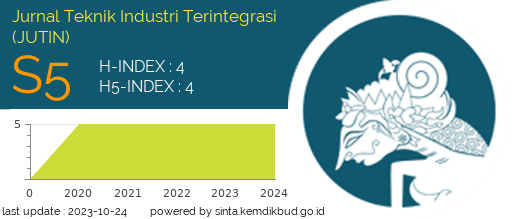Penerapan Teknologi Realitas Virtual untuk Pelatihan Keselamatan Pekerja dalam Operasi Mesin Industri Berat
DOI:
https://doi.org/10.31004/jutin.v7i2.26651Keywords:
Teknologi Realitas Virtual; Pelatihan Keselamatan Pekerja; Industri Berat.Abstract
The application of Virtual Reality (VR) technology in worker safety training in heavy industries has been an intriguing subject of research in recent years. This journal article aims to provide a literature review on how VR is utilized in this context. The literature review method is employed to gather, evaluate, and synthesize findings from various related studies. This literature review reveals that the use of VR has proven effective in enhancing worker safety and operational skills in various heavy industries. By enabling training in a simulated virtual environment, VR technology can deliver realistic experiences without actual physical risks. Previous studies indicate that workers who receive VR training tend to have a better understanding of potential risks and safety procedures, leading to a decrease in accident rates. The advantages of VR also include its ability to provide repeatable training without significant additional costs. This allows workers to gain consistent hands-on experience, reinforcing their skills in hazardous situations. Thus, the use of VR in worker safety training in heavy industries promises significant benefits in efforts to improve worker safety and well-being.References
Effendi, Ryan., Iwan Z., Komeyni R. (2023). Kesehatan dan Keselamatan Kerja. Penerbit: Ruang Karya Bersama. ISBN: 978-623-353-602-8.
Gao, X., Zhou, P., Xiao, Q., Peng, L., & Zhang, M. (2023). Research on the Effectiveness of Virtual Reality Technology for Locomotive Crew Driving and Emergency Skills Training. Applied Sciences, 13(22), 12452. https://doi.org/10.3390/app132212452
Hamad, A., & Jia, B. (2022). How Virtual Reality Technology Has Changed Our Lives: An Overview of the Current and Potential Applications and Limitations. International Journal of Environmental Research and Public Health, 19(18), 11278. https://doi.org/10.3390/ijerph191811278
Holuša, V., Van?k, M., Beneš, F., Švub, J., & Staša, P. (2023). Virtual Reality as a Tool for Sustainable Training and Education of Employees in Industrial Enterprises. Sustainability, 15(17), 12886. https://doi.org/10.3390/su151712886
Hovanec, M., Korba, P., Vencel, M., & Al-Rabeei, S. (2023). Simulating a Digital Factory and Improving Production Efficiency by Using Virtual Reality Technology. Applied Sciences, 13(8), 5118. https://doi.org/10.3390/app13085118
Hu, H., Chen, J., Zhu, J., Yang, Y., & Zheng, H. (2024). Design and Development of an Integrated Virtual-Reality Training Simulation Sand Table for Rail Systems. Information, 15(3), 141. https://doi.org/10.3390/info15030141
Kami?ska, D., Sapi?ski, T., Wiak, S., Tikk, T., Haamer, R. E., Avots, E., ... Anbarjafari, G. (2019). Virtual Reality and Its Applications in Education: Survey. Information, 10(10), 318. https://doi.org/10.3390/info10100318
Kuna, P., Hašková, A., & Borza, ?. (2023). Creation of Virtual Reality for Education Purposes. Sustainability, 15(9), 7153. https://doi.org/10.3390/su15097153
Liu, L., Yao, X., Chen, J., Zhang, K., Liu, L., Wang, G., & Ling, Y. (2024). Virtual Reality Utilized for Safety Skills Training for Autistic Individuals: A Review. Behavioral Sciences, 14(2), 82. https://doi.org/10.3390/bs14020082
Liu, X.-W., Li, C.-Y., Dang, S., Wang, W., Qu, J., Chen, T., & Wang, Q.-L. (2022). Research on Training Effectiveness of Professional Maintenance Personnel Based on Virtual Reality and Augmented Reality Technology. Sustainability, 14(21), 14351. https://doi.org/10.3390/su142114351
Marougkas, A., Troussas, C., Krouska, A., & Sgouropoulou, C. (2023). Virtual Reality in Education: A Review of Learning Theories, Approaches and Methodologies for the Last Decade. Electronics, 12(13), 2832. https://doi.org/10.3390/electronics12132832
Mora-Serrano, J., Muñoz-La Rivera, F., & Valero, I. (2021). Factors for the Automation of the Creation of Virtual Reality Experiences to Raise Awareness of Occupational Hazards on Construction Sites. Electronics, 10(11), 1355. https://doi.org/10.3390/electronics10111355
Paszkiewicz, A., Salach, M., Dymora, P., Bolanowski, M., Budzik, G., & Kubiak, P. (2021). Methodology of Implementing Virtual Reality in Education for Industry 4.0. Sustainability, 13(9), 5049. https://doi.org/10.3390/su13095049
Regal, G., Pretolesi, D., Schrom-Feiertag, H., Puthenkalam, J., Migliorini, M., De Maio, E., ... Xerri, G. P. (2023). Challenges in Virtual Reality Training for CBRN Events. Multimodal Technologies and Interaction, 7(9), 88. https://doi.org/10.3390/mti7090088
Ruan, J., & Xie, D. (2021). Networked VR: State of the Art, Solutions, and Challenges. Electronics, 10(2), 166. https://doi.org/10.3390/electronics10020166
Shringi, A., Arashpour, M., Golafshani, E. M., Dwyer, T., & Kalutara, P. (2023). Enhancing Safety Training Performance Using Extended Reality: A Hybrid Delphi–AHP Multi-Attribute Analysis in a Type-2 Fuzzy Environment. Buildings, 13(3), 625. https://doi.org/10.3390/buildings13030625
Strza?kowski, P., B??, P., Szóstak, M., & Napiórkowski, M. (2024). Application of Virtual Reality (VR) Technology in Mining and Civil Engineering. Sustainability, 16(6), 2239. https://doi.org/10.3390/su16062239
Xu, Z., & Zheng, N. (2021). Incorporating Virtual Reality Technology in Safety Training Solution for Construction Site of Urban Cities. Sustainability, 13(1), 243. https://doi.org/10.3390/su13010243
Yoo, J. W., Park, J. S., & Park, H. J. (2023). Understanding VR-Based Construction Safety Training Effectiveness: The Role of Telepresence, Risk Perception, and Training Satisfaction. Applied Sciences, 13(2), 1135. https://doi.org/10.3390/app13021135
Zhou, Y., Oubibi, M., & Wijaya, T. T. (2023). Unlocking the Potential: A Comprehensive Evaluation of Augmented Reality and Virtual Reality in Education. Electronics, 12(18), 3953. https://doi.org/10.3390/electronics12183953
Downloads
Published
How to Cite
Issue
Section
License
Copyright (c) 2024 Ryan Effendi, Iwan Zulfikar, Komeyni Rusba, Siska Ayu Kartika, Satrio Darma Utama

This work is licensed under a Creative Commons Attribution-ShareAlike 4.0 International License.



